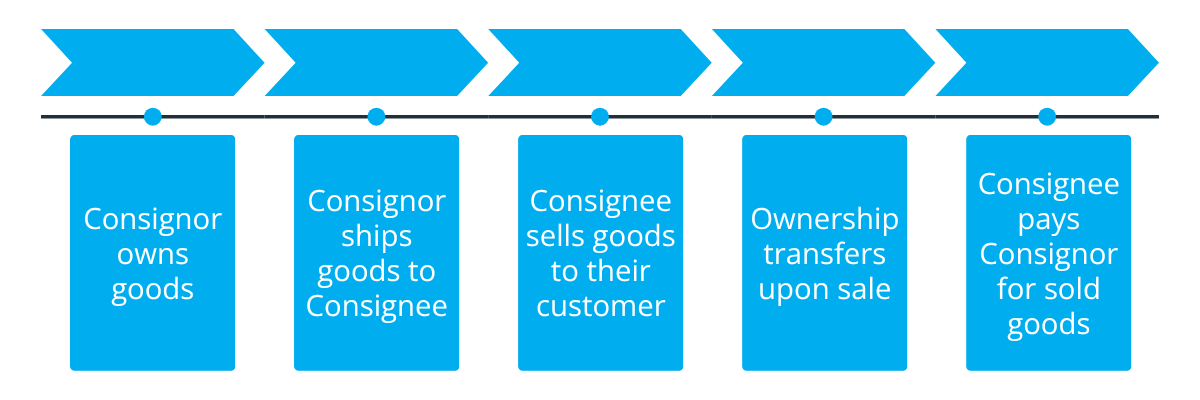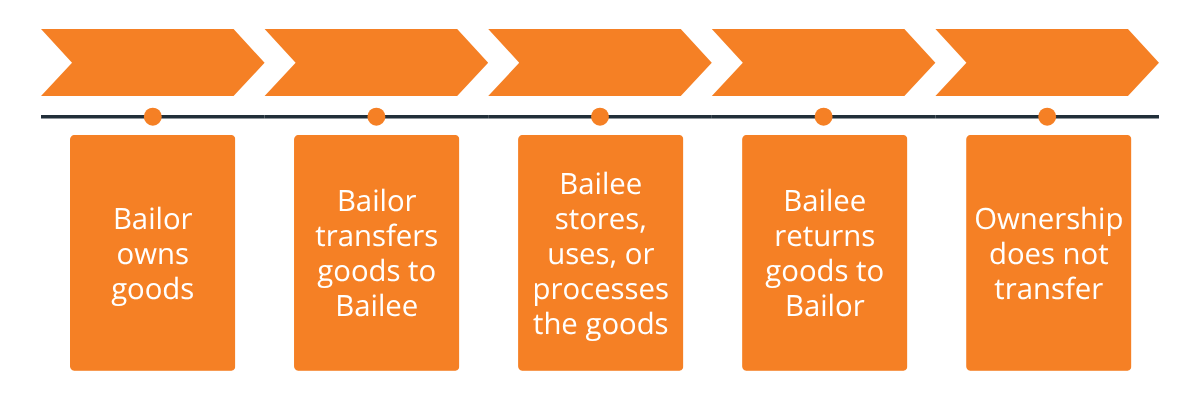Are Consignment and Bailment the Same? Is Consignment a Form of Bailment?
Consignment and bailment may seem similar, but they’re not the same. Both involve providing goods to another party while maintaining ownership. However, the purpose and use of those goods set them apart.
- Consignment: The goal is to sell the goods.
- Bailment: The goods are not intended for sale, they’re stored, processed, or used for a specific purpose.
What Is Consignment? How Does Consignment Work?
In a consignment arrangement, one party (the consignor) provides goods to another party (the consignee) to sell on their behalf. The consignor retains ownership of the goods until they’re sold, and once sold, the consignee pays the consignor from the proceeds.

When Is Consignment Used?
Consignment is common when goods are high-value, slow-moving, or widely distributed but hard to sell in bulk.
Examples of consignment goods:
- Apparel (clothing, shoes, accessories): Retailers avoid buying large inventories upfront.
- Furniture: Large, expensive items that sell slowly.
- Industrial or medical equipment: High-cost products with niche demand.
In these situations, manufacturers supply inventory to their customers but keep it on their books until a sale happens.
What Is Bailment? How Does Bailment Work?
A bailment occurs when the owner of goods (the bailor) temporarily transfers possession to another party (the bailee) for a specific purpose. The goods are either returned or handled according to the bailor’s instructions once that purpose is complete. There’s no transfer of ownership or title.

The key is the transfer of goods is “for some express purpose” and once the bailee has fulfilled this purpose, the goods are returned to the bailor. The transfer of physical possession of the goods not a transfer of title or ownership of the goods.
When Is Bailment Used?
A bailment agreement is typical when transferring the goods for an express purpose, such as safe storage, repair, or improvement.
Examples of bailmentarrangements:
- Electronics: A component manufacturer sends parts to a third party for assembly, and the assembled product is returned.
- Manufacturing: A company sends a custom die to a contract manufacturer, who returns it after use.
- Mining: A mining company ships raw materials to a processor, who returns the refined goods.
What’s the Difference Between a Consignment and a Bailment?
The primary difference between a consignment agreement and a bailment agreement is the intent for the goods:
- Consignment: “You sell it for me, and I’ll pay you once it’s sold.”
- Bailment: “You hold or use my property, but you must return it or handle it as agreed.”
Let’s dive a little deeper. In this chart, we break down the parties involved, ownership of the goods, payment triggers, and whether goods can be repossessed.
| CONSIGNMENT | BAILMENT | |
| Purpose | To sell goods through another party | To store, process, or use goods without selling them |
| Intent | Sell the goods | Use the goods for a specific purpose, not sell them |
| Ownership | Consignor retains ownership until goods are sold | Bailor retains ownership at all times |
| Role of Other Party | Consignee sells goods for the consignor | Bailee uses, stores, or processes goods, then returns them |
| Does Title Pass? | Yes, when goods are sold | No, ownership stays with bailor |
| Payment Trigger | Payment due after goods are sold | No sale involved; goods are returned |
| Inventory Accounting | Goods remain on consignor’s books until sold | Goods remain on bailor’s books |
| Can Goods Be Repossessed? | Yes, if a UCC is properly filed | Yes, if a UCC is properly filed and goods haven’t been commingled |
Should You File a UCC?
Technically, you’re not required to file a UCC for either consignment or bailment. Here’s why:
- Consignment often falls under UCC Article 9 (Secured Transactions).
- Bailment, since it doesn’t involve a sale, generally falls under UCC Article 2 (Sale of Goods).
However, it’s risky not to file.
Releasing goods to another party, whether for sale or processing, can leave you vulnerable. If the other party defaults or files for bankruptcy and you haven’t filed a UCC, you might lose your right to repossess your goods.
Bottom line: File a UCC to protect your interest. It ensures you’re a secured creditor and allows you to repossess your goods if things go wrong.
Need Help?
NCS Credit can help you navigate UCC filings and protect your receivables. Don’t leave your goods, or your money, at risk. Contact us today!


